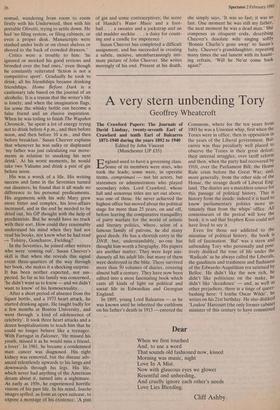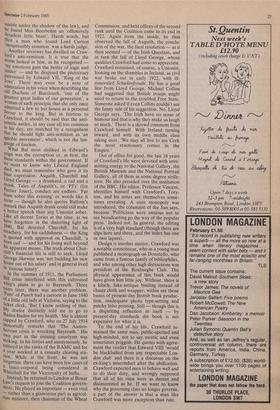A very stern unbending Tory
Geoffrey Wheatcroft
The Crawford Papers: The Journals of David Lindsay, twenty-seventh Earl of Crawford and tenth Earl of Balcarres 1871-1940 during the years 1892 to 1940 Edited by John Vincent (Manchester UP £35)
Fngland used to have a governing class. Some of its members were stars, who took the leads; some were, in operatic terms, comprimari — not bit actors, but statesmen or administrators who played secondary roles. Lord Crawford, whose full and sonorous titles are set out above, was one of those. He never achieved the highest office but moved about the political stage for more than 25 years, on and off, before leaving the comparative tranquillity of party warfare for the world of artistic and literary politics, where, scion of a famous family of patrons, he did many good deeds. He has a shortish entry in the DNB, but, understandably, no-one has thought him worth a biography. His papers are another matter. They were kept assi- duously all his adult life, but many of them were destroyed in the blitz. There survived more than 50 volumes of diaries, covering almost half a century. They have now been edited into a most fascinating book which casts all kinds of light on political and social life in Edwardian and Georgian England.
In 1895, young Lord Balcarres — as he was known until he inherited the earldoms on his father's death in 1913 — entered the
Commons, where for the ten years from 1903 he was a Unionist whip, first when the Tories were in office, then in opposition in the years of the Liberal government. Bal- carres was thus peculiarly well placed to observe the Tories in their great defeat; their internal struggles, over tariff reform and then, when the party had recovered by 1910, over the Parliament Bill; the Home Rule crisis before the Great War; and, more generally, from the other side of the House, the strange death of Liberal Eng- land. The diaries are a matchless source for this passage of political history. This is history from the inside: indeed it is hard to know parliamentary politics more in- timately than from the whips' office. All connoisseurs of the period will love the book; it is sad that Stephen Koss could not have lived to see it.
Even for those not addicted to the minutiae of political history, the book is full of fascination. '13al' was a stern and unbending Tory who personally and posi- tively disliked the tone of life under the 'Radicals' as he always called the Liberals, the gaudiness and trashiness and flashiness of the Edwardo-Asquithian era satirised by Belloc. He didn't like the new rich, he didn't like politicians on the make, he didn't like 'decadence' — and, as well as other prejudices, there is a tinge of queer bashing here: 'I loathe Oscar Wilde', he writes on his 21st birthday. He also disliked `Loulou' Harcourt (the only former cabinet minister of this century to have committed suicide under the shadow of the law), and he found Max Beerbohm an 'offensively decadent little beast'. Harsh words, but then a man who found Lord Curzon Inexpressibly common' was a harsh judge.
Another reviewer has dwelled on Craw- ford's anti-semitism. It is true that the worm lurked in him, as he recognised — 'My emotions gain the better of logic and justice' — and he despised the plutocracy Patronised by Edward VII, 'King of the Jews'. There may even be a note of admiration in his voice when describing the Old Duchess of Buccleuch, 'one of the greatest great ladies of our generation', a Woman of such principle that she only once admitted a Jew to her house as a personal favour to the king. But in fairness to Crawford, it should be said that the anti- Semitic asides, in any case all too common in his day, are matched by a recognition that he should fight anti-semitism as 'an ignoble movement', which is not the lan- guage of fascism.
What Bal most disliked in Edward's reign was the corruption or, at best, the loose standards within the government. If we want to know why Liberal England died, we must remember who gave it its final expression: Asquith, Churchill and Lloyd George — a drunkard, a cad and a Crook. Tales of Asquith's, or 'RI's' (for Perrier Jouet), conduct are endless. 'Far from sober this evening' or words like it recur — though he also quotes Balfour's remark that Asquith drunk could still make a better speech than any Unionist sober. Like all decent Tories at the time, as we have forgotten in the distorting light of 1940, Bal detested Churchill, for his treachery, for his caddishness — the King IS quoted with approval on Churchill, 'a born cad' — and for his living well beyond his apparent means. The truth about Chur- chill's financial life is still to seek. Lloyd George likewise was 'not building his new 'Muse out of his salary' and in general lived in 'riotous luxury'. T, In the summer of 1911, the Parliament -rill' crisis interfered with this cultivated Whip's plans to go to Bayreuth. Three Years later, there was another problem. Pont' of Punch had a cartoon in June 1940 Of a little old lady at Victoria, saying to the ticket clerk, 'But I know nothing of that. My doctor distinctly told me to go to Baden-Baden for my health.' She is almost capped by Crawford, who on 27 July 1914 anmortally remarks that 'The Austro- Servian crisis is wrecking Bayreuth.' His own part in the ensuing cataclysm was striking. In his forties and anonymously, he enlisted in the ranks of the RAMC and for a Year worked at a casualty clearing sta- tion. While at the front, he was not forgotten: there can have been few cases of a lance-corporal being considered in Whitehall for the Viceroyalty of India. Instead, he returned to London at Bonar k.aw's request to join the Coalition govern- ment. He played an important — even vital --- rather than a glamorous part as agricul- ture minister, then chairman of the Wheat
Commission, and held offices of the second rank until the Coalition came to its end in 1922. Again from the inside, he thus observed the fall of Asquith, the conclu- sion of the war, the final resolution — as it then seemed — of the Irish Question, and in turn the fall of Lloyd George, whose qualities Crawford had come to appreciate. Crawford remained, of course, a Unionist, looking on the shambles in Ireland, as civil war broke out in early 1922, with ill- concealed Schadenfreude. He has a good line from Lloyd George. Michael Collins had suggested that British troops might need to return to the troubled Free State. Someone asked if even Collins couldn't see the funny side of his suggestion. No, Lloyd George says, 'The Irish have no sense of humour and that is why they make us laugh so much.' There is a shrewd comment from Crawford himself. With Ireland turning inward, and with its own middle class taking over, 'We may all live to see Cork the most reactionary corner in the Empire Out of office for good, the last 18 years of Crawford's life were devoted with unre- mitting energy to the National Gallery, the British Museum and the National Portrait Gallery, all of them in some degree strife- torn. He also presided over the institution of the BBC. His editor, Professor Vincent, identifies himself with Crawford's Tory- ism, and his notes are themselves some- times revealing. A state monopoly was introduced, the columnist of the Sun says, because 'Politicians were anxious not to see broadcasting go the way of the popular press.' Indeed not. In general, the editing is of a very high standard (though there are slips here and there, and the index has one or two lapses).
Design is another matter. Crawford was a notable connoisseur, who as a young man published a monograph on Donatello, who came from a famous family of bibliophiles, and who among other high distinctions was president of the Roxburghe Club. The physical appearance of this book would have given him little joy. Without, there is a kitsch, fake-antique binding instead of chaste cloth and wrapper; within are those banes of present-day British book produc- tion, inadequate photo type-setting and patchy litho printing. Still — though this is a dispiriting reflection in itself — by present-day standards the book is not expensive for what it is.
To the end of his life, Crawford re- mained the same man, public-spirited and high-minded, not to say ascetic and even sometimes priggish. He quotes with agree- ment the verdict that Edward VIII 'would be blackballed from any respectable Lon- don club' and there is a discursus on the ex-king's misconduct after the abdication.
Crawford expected men to behave well and to do their duty, and wrongly supposed that all of his class were as decent and disinterested as he. If we want to know why the governing class no longer governs, a part of the answer is that a man like Crawford was more exception than rule.











































 Previous page
Previous page